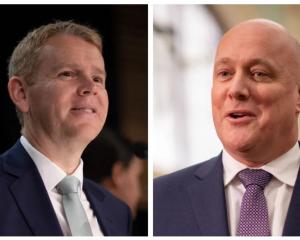And no-one can remember it happening during Phil Goff's time at Labour's helm. Or David Shearer's for that matter.
By late Wednesday afternoon, the first of the Barbarians were at the gates.
They had been invited into Labour's lair on the third floor of Parliament Buildings.
The evening function hosted by Andrew Little had Labour's leader and his MPs schmoozing with some of the cream of New Zealand capitalism.
Alongside the entrepreneurs and innovators of New Zealand industry were professional lobbyists and most of Wellington's PR practitioners as well as representatives from non-governmental organisations, such as the Salvation Army.
And just to assure his long-time mates, a smattering of senior trade union officials.
The semi-serious joke doing the rounds during the function was that Labour was showing itself to be ''open for business''.
More than that, the composition of the guest list was saying business had nothing to fear from a Labour leader with a strong union background.
To the contrary, Mr Little's experience in negotiations has given him a much better understanding of how businesses thrive or fail than most MPs enjoy.
Mr Little was also saying an alternative Labour-led government would be inclusive. In that vein, Labour was starting the process of listening to what business wants.
But the paramount lesson to be taken from the evening was that this was Labour endeavouring to lift its economic credentials in middle New Zealand.
That crucial voter segment has long had far more faith in National's reliability when it comes to managing the economy - even though Labour's track record in recent decades has largely been no worse than National's.
Labour's Achilles' heel has been government spending, which blew out in significant fashion in 2008, the last year Labour was in power.
While National will continue to push the line of Labour as over-spenders, Mr Little will try to shift the argument.
He will stress Labour is just as keen and capable of creating a wealthier economy.
The difference between National and Labour is how that wealth is distributed, or redistributed.
The other lesson to take from Wednesday night's function - and one National would be wise to heed - is Mr Little's capacity to surprise - something he first did with his ''cut the crap'' jibe at John Key.
While well imbued with core Labour values, Mr Little is less hung up about what means are used to reach the goals linked to those values.
While revealing Mr Little's capacity to think outside the square, the function will not change the growing perception outside Parliament that Mr Little has gone off the boil.
The pithiest reference to this came from TV3's resident court jesters, Jono Pryor and Ben Boyce.
Having mercilessly lampooned Mr Key over you know what, the pair assured viewers the same standard would be applied to Labour.
But that hinged on Labour doing ''something interesting, anything interesting at all''.
In other words, fat chance.
The two comedians are right.
Mr Little is absolutely adamant Labour will not be pressured into adopting stances or suggesting solutions before it is ready - and that will not happen until much later in the electoral cycle.
In the age of the 24-hour news cycle which demands spontaneous reactions and instant solutions, this will be very difficult to stick to, especially when competing parties are not playing by the same rules.
There is no question Mr Little - who soon marks six months as leader - has lost much of the momentum he generated following his election as Labour's leader last November.
That was the unavoidable byproduct of the Northland by-election.
Labour's decision not to contest the seat in the normal hell-for-leather fashion was based on a number of things, such as not splitting the anti-National Party vote.
Labour's big worry was that no matter how hard or how well the party campaigned, it would still only come third at best.
Mr Little would be branded as a failure by the media.
That could not be allowed to happen.
As it is, the opinion polls have been a reality check for those pushing Mr Little's barrow.
The frequency of Labour's leadership changes plus the associated displays of disunity last year probably deprived him of a political honeymoon.
However, he did enjoy a purple patch before the by-election during which he restored Labour to the top of the pecking order when it comes to being the first call the media makes, whereas Mr Shearer, when leader, found himself squeezed out by Winston Peters and Russel Norman.
Mr Little's preferred prime minister rating is hovering around 13%, which means he has to convince many Labour voters he is up to the job, let alone supporters of other parties.
Labour's strategists have assessed that face-to-face contact with voters is the best means of achieving cut-through.
Mr Little is spending between two and four days out of Wellington each week on a schedule which will have him visiting almost every community by the end of this year.
His other achievement has been to keep Labour out of the news.
The factional battle within the wider Labour Party, as well as the caucus, has gone silent.
The loser is National, whose ministers are now in the media glare all the time and can no longer rely on Labour's ructions to provide timely distractions from their mistakes.
Restoring voters' confidence in a political party does not happen overnight.
Mr Little's slowly-slowly approach is going to test Labour nerves.
The advice from on high to the party faithful is simple: be patient; trust us, we know what we are doing.
• John Armstrong is The New Zealand Herald political correspondent.












